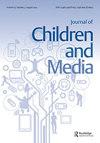Free, appropriate, public, and educational? Screen-schooling U.S. children with disabilities during the 2020 pandemic
IF 2.1
3区 心理学
Q2 COMMUNICATION
引用次数: 2
Abstract
I was born in 1969, the year Sesame Street debuted. I love and respect educational screen media. However, screens exist in environments that modify the effectiveness of screen-delivered education far more than I could have imagined pre-COVID-19, especially for children with disabilities. In the U.S., kids with disabilities were granted the right to a public education in the 1970s. The national shift to online instruction was a metaphorical time machine sending them back to the 1960s. My goal in this essay is to explain how even an extensively privileged white family headed by two COVID-free parents with health insurance, the economic security of tenure, the option to work from home, and home ownership in a district that loans a laptop to every student, still failed to adequately educate our own children with disabilities. Kids like ours whose parents have fewer options and resources may be receiving no education at all.免费的,合适的,公共的,教育的?在2020年大流行期间对美国残疾儿童进行筛查
我出生于1969年,也就是《芝麻街》开播的那一年。我热爱并尊重教育屏幕媒体。然而,屏幕存在的环境对屏幕提供教育的有效性的影响远远超出了我在covid -19之前的想象,特别是对残疾儿童。在美国,残疾儿童在20世纪70年代被赋予了接受公立教育的权利。全国向在线教学的转变就像一台时间机器,把他们送回了上世纪60年代。我在这篇文章中的目标是解释,即使是一个享有广泛特权的白人家庭,由两位没有新冠病毒的父母领导,拥有医疗保险,终身教职的经济保障,在家工作的选择,以及每个学生都有笔记本电脑的地区的住房所有权,仍然未能充分教育我们自己的残疾儿童。像我们这样的孩子,父母的选择和资源更少,可能根本就没有接受过教育。
本文章由计算机程序翻译,如有差异,请以英文原文为准。
求助全文
约1分钟内获得全文
求助全文

 求助内容:
求助内容: 应助结果提醒方式:
应助结果提醒方式:


